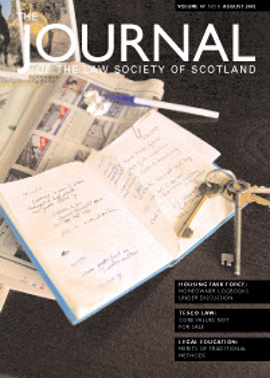Plain speaking
Here is a typical lawyer’s letter to a client:
Dear Client
Your Property
I refer to the above. The Land and Charge Certificates have recently been issued from the Land Register. Accordingly I enclose herewith my firm’s business account together with Cash Statement. The outstanding balance is that detailed in the Cash Statement and I await your settlement cheque.
Here, as well as some of the offending words and expressions mentioned in an earlier column, there are also technical terms, or jargon, that some clients will find daunting. Does the client know what ‘Land Certificate’, ‘Charge Certificate’ or the ‘Land Register’ means? And why use ‘Cash Statement’ when ‘Statement’ is shorter and better? This is my rewrite:
Dear Client
Your Property
The office responsible for keeping property records is The Registers of Scotland. Every time people buy or sell property, the Registers process the documents and update their records.
They have now finished the process for the property you bought and have sent me the Land Certificate and the Charge Certificate.
- The Land Certificate shows the property, the title conditions and your ownership.
- The Charge Certificate shows the mortgage to your lender.
I am sending you a copy of both documents for your information. I am sending the originals to your lender – as the lender insists – to keep safe.
I am also sending you an invoice and Statement. The invoice shows our charges as agreed. The Statement shows the money received and paid out for you. You will see there is a balance due by you and I would be grateful if you would send me your cheque.
The first point to make is that the rewritten letter is longer. I do not believe that plain language versions of documents must always be shorter. Sometimes you should take more words to explain. The test, surely, is not whether it is shorter but whether it’s clearer.
The second point is the use of bullets to highlight part of the letter. Good document layout can be just as important in putting across the right message. This is a topic I’ll return to in a future column.
The third point is that it is my rewrite. You may have a different way of explaining the jargon. (If you think you can do better, please send your own rewrite in. In this business, you never stop learning.)
There is no absolutely right answer. There’s just a question: does the client understand it? If he does, that’s as good as it gets.
In this issue
- Scottish Solicitors’ Discipline Tribunal
- What price the core values
- “It’s good to talk”
- Homeowner logbooks a step too far
- The Judicial Appointments Board – a misnomer
- Changed days
- In praise of rote learning
- The best laid plans
- Communication can curb complaints
- Separate probation and community service
- Simplifying insolvency proceedings?
- Online negotiation – changing the norms
- Website reviews
- Under pressure
- In practice
- Europe
- Plain speaking
- Book reviews
- When law met hip-hop






